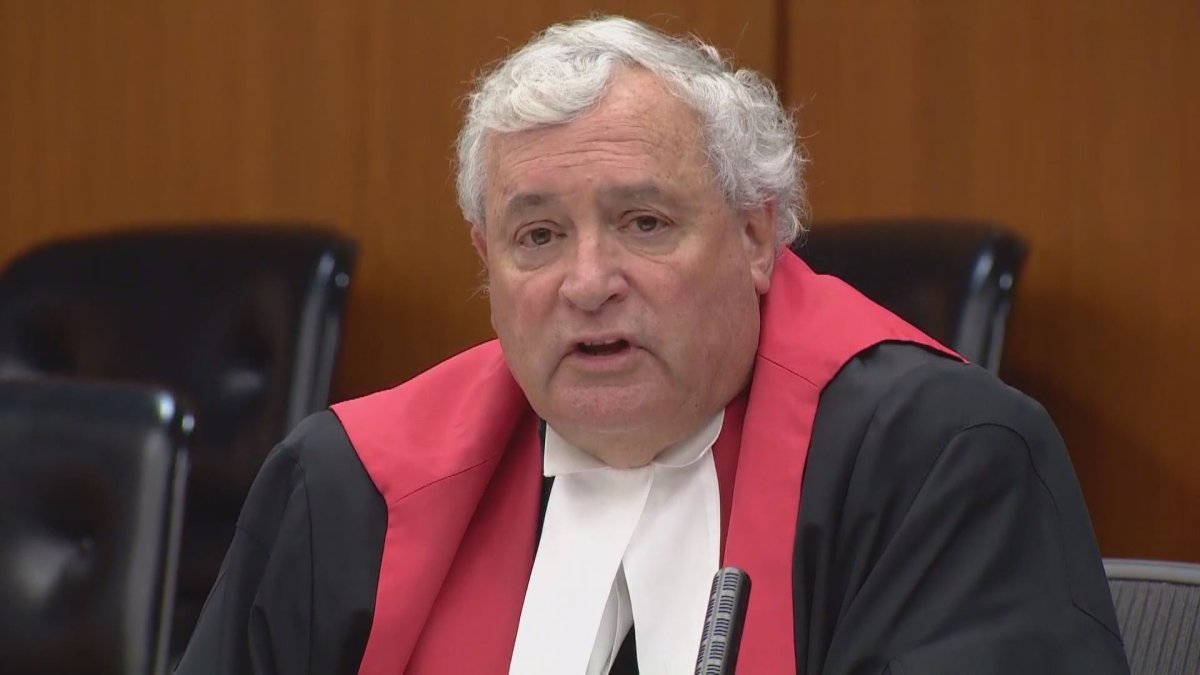Less than a week after Justice Robin Camp admitted he had a “non-existent” knowledge of Canadian law while presiding over a sex-assault trial, another Alberta judge is facing scrutiny for what legal experts call a major legal error.

In his verdict in the Travis Vader double-murder trial, Alberta Court of Queen’s Bench Justice Denny Thomas relied on a section of the Criminal Code that has been declared unconstitutional. Vader’s lawyer has already filed an appeal and asked for a mistrial.
Meantime, two other Alberta judges are under review due to their handling of sex-assault cases. One case centres on Provincial Court Judge Pat McIlhargey’s June 2015 acquittal of a 16-year-old boy accused of raping a 13-year-old girl in a park. In the other case, Provincial Court Judge Michael Savaryn acquitted a 15-year-old boy who grabbed the breasts and buttocks of a girl, also 15, in a high school hallway and tried to kiss her.
READ MORE: 2 more Alberta sex assault cases under review amid ‘knees together’ controversy
So, why are Alberta judges making such apparently glaring mistakes?

“One potential reason is that there’s not enough continuing legal education or training given to judges who come from a non-criminal background but hear criminal cases,” says Asad Kiyani, an assistant professor of international and criminal law at Western University.

University of Calgary law professor Kathleen Mahoney agrees the lack of education for judges is an issue, calling it a systemic problem.
“Say there’s a commercial lawyer who’s practised commercial law for the last 30 years and then is appointed to the criminal court. I think it’s fair game to say, ‘what does that person know about criminal law?’ The answer would probably be nothing.
“And then they would have to start from square one to learn that and at the same time they’re practising, and at the same time they’re sitting in court. … It’s a huge expectation that I think is unrealistic.”
Watch below: Retired Justice Allan Wachowich provides his opinions about the training newly appointed judges receive and the challenges they face as the hearing centred on Justice Robin Camp’s continues in Calgary. Tom Vernon reports on Sept. 9.

Mahoney adds much of the continuing education offered to judges only involves “a conference here and a conference there,” not necessarily resulting in a deep understanding of the law. She says the quality of the training program and teacher, and the attitudes of the student judge are also factors and suggests there should be a way to evaluate judicial education.
“You look at pilots, for example. They have to be evaluated on a very regular basis because they have so many people’s lives at stake in the way in which they’re applying their education.
“Judges have people’s lives at stake every single day in front of them. Not life or death … but they certainly have people’s lives at stake in terms of their children, finances, their reputation, whether they’re going to jail, if they keep their freedom or not. … All of those extremely important life-changing decisions are in the judge’s hands day in and day out on the bench.”
Mahoney adds that the appointment process may be responsible for the knowledge gap on sex-assault cases specifically, because the “vast majority of judges in Canada” are from a certain demographic.
“Their average age is 53; they’re white males and by and large they come from large law firms where they practise civil law.”
Mahoney suggests one problem with a lack of diversity on the bench is that people don’t live identical lives, especially in terms of sexual assault, and therefore don’t understand other peoples’ experiences.
“Females shape their lives, make decisions based on the threat of sexual assault all the time, day in and day out … Where are you going to park your car? etc. Men never have to think about that, or very rarely.
“To help us understand ‘the other,’ as we say, if you have no information, you apply stereotypical thinking you have in your culture, background, friendships, associations over the years … instead of finding out what it is that that person has experienced. So that’s why education is critical.”
Citing the Vader verdict, Kiyani says a second “inexplicable” problem related to errors in court is that Parliament has yet to change or amend the Criminal Code to remove “clearly unconstitutional provisions like Section 230,” the section cited by Thomas in his verdict on Thursday.
Watch below: Travis Vader case – full verdict delivered on camera in historic case
“It’s quite easy for someone who doesn’t have the familiarity with the law to look back at the law and say, ‘OK, well, this is the Criminal Code so this must be applicable law,’” Kiyani says, adding it happens regularly in criminal trials.
He says judges will often instruct juries on the technicalities of a legal offence or the requirements of that offence in writing, and pass on a provision of the code that’s unconstitutional by mistake. Section 230, in particular, is often passed on in writing, which is usually remedied based on what the judge says verbally.
“So, what the judges tell the jury is different to what they pass them on paper. So we say, ‘OK, that’s not a significant legal error;’ we’ll allow the jury verdict to stand notwithstanding that this is a problem.
“It happens quite routinely so I think it’s perhaps a bit unfair to pile on to Justice Thomas in a sense, because Parliament hasn’t taken up its responsibilities to amend the code, and it just does happen, even with people who deal with criminal law regularly.”



Comments